Key takeaways:
- Understanding key contract principles such as mutual consent, consideration, and legality is essential for forming binding agreements.
- Effective contract negotiations are crucial for tailoring agreements to the specific needs of both parties, fostering trust and collaboration.
- A thorough contract review process, including breaking down sections and using checklists, helps prevent misunderstandings and protects against potential pitfalls.
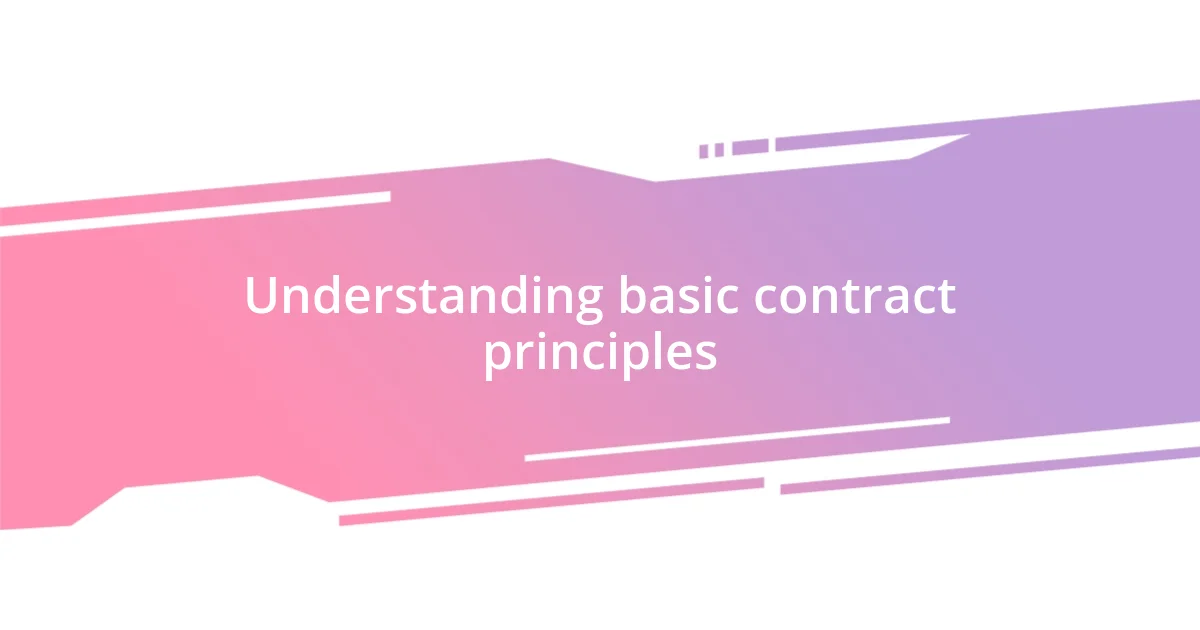
Understanding basic contract principles
One of the foundational principles of contract law that I’ve come to appreciate is the idea of mutual consent. It’s fascinating to think about how two parties can come together, each with their own needs and expectations, and create a binding agreement. I remember a time when I was negotiating a service contract; both sides had to be transparent about our requirements, which really emphasized the importance of communication in mutual consent.
Another critical aspect is consideration, which refers to what each party stands to gain from the contract. I used to think this only involved financial terms, but it can be anything of value. For instance, in a partnership agreement I was involved in, I learned that the time and effort committed by one partner were just as crucial as the funds contributed by another, showing me that value takes many forms.
Lastly, there’s the principle of legality, which governs whether the subject matter of the contract is lawful. I’ve seen the consequences firsthand when I inadvertently entered into an agreement that wasn’t compliant with local regulations; it was a wake-up call. Wouldn’t it feel frustrating to later realize that an agreement is void because it involved something illegal? That’s why understanding these basic principles not only protects you but also ensures that what you’re building is legitimate and lasting.
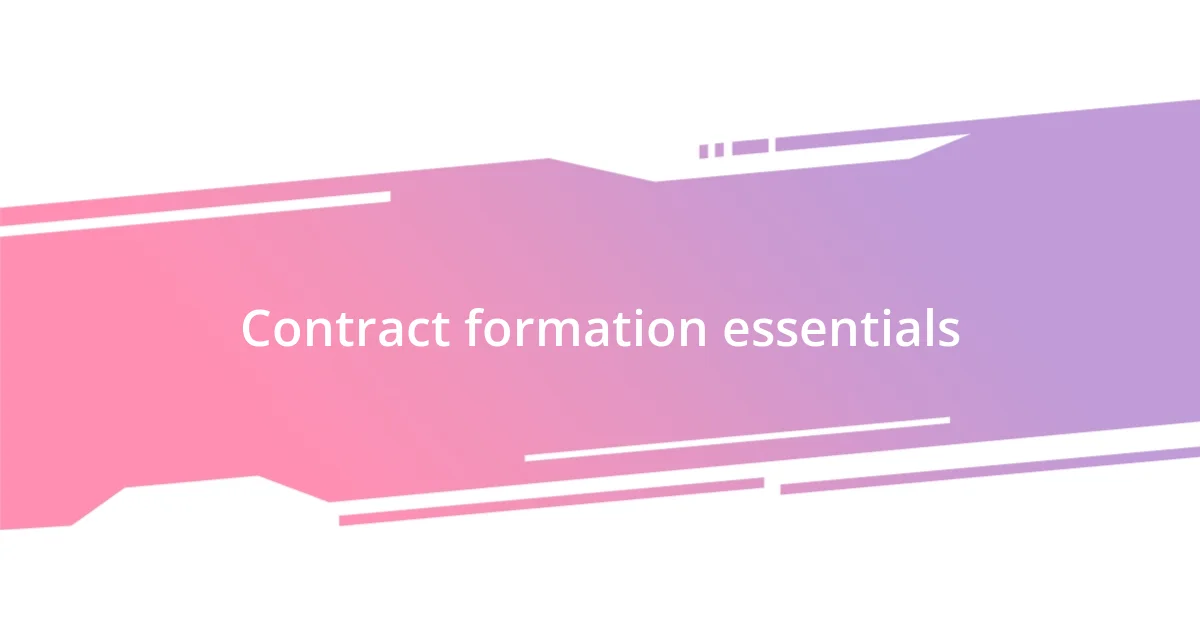
Contract formation essentials
One of the essential elements of contract formation is the offer and acceptance. An offer lays the groundwork, and acceptance is the affirmation that brings the contract to life. I vividly recall a time when I was crafting a freelance project proposal. Presenting my offer clearly was crucial, but the moment my client responded with a clear acceptance, it transformed my proposal into a binding agreement. The effectiveness of that exchange underscored for me how pivotal these initial stages are in any contractual relationship.
Key elements that contribute to effective contract formation include:
- Offer: A definitive proposal presented by one party.
- Acceptance: Unqualified agreement to the terms of the offer.
- Mutual Consent: Both parties must agree willingly to the terms.
- Consideration: Something of value exchanged between the parties.
- Legality: The contract’s subject matter must be legal and compliant with relevant laws.
- Capacity: Both parties must have the legal ability to enter into a contract.
For me, it’s not just about the legal definitions; it’s about the connection and clarity built through these steps. I often think of contract formation as a dance, where each partner must understand their role and respond appropriately—without that chemistry, the whole process can flounder.
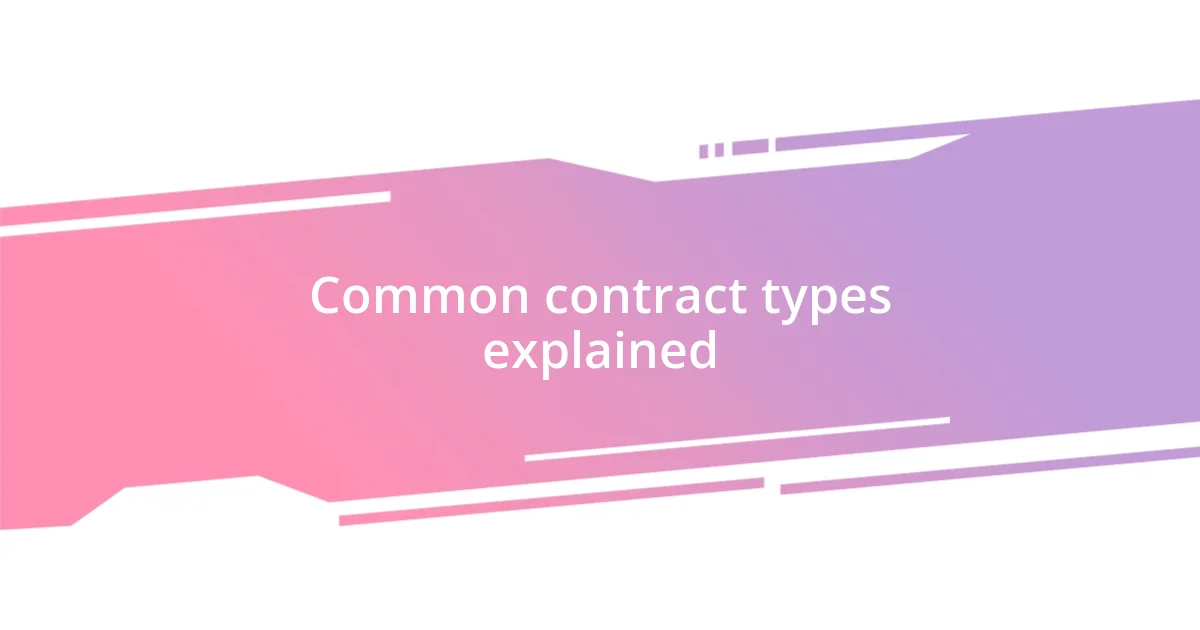
Common contract types explained
Common contract types are essential to understand as they form the backbone of many agreements in both personal and professional settings. For instance, a sales contract is vital when you’re buying or selling goods, outlining the specifics of the exchange, including price, delivery, and payment terms. Reflecting on my own experience, I remember when I signed a sales contract for a vintage car. It detailed not only the price but also conditions regarding maintenance and any potential defects, serving as a shield against future disputes.
Another common type is the lease agreement, which I find particularly interesting because it governs the rental of property. I once had a roommate experience where our lease agreement not only outlined the rent but also included terms related to utilities and maintenance responsibilities. It made me realize how these contracts can provide a framework for smooth coexistence or, conversely, lead to tension if not followed correctly.
Finally, there are employment contracts, which can vary widely but typically include details about job responsibilities, compensation, and benefits. In my earlier career, I encountered an employment contract that clearly laid out promotion timelines and performance expectations. Having that clarity ensured that both my employer and I were on the same page, greatly reducing confusion down the line.
| Contract Type | Description |
|---|---|
| Sales Contract | Outlines terms for buying or selling goods, specifying price and conditions. |
| Lease Agreement | Governs rental arrangements, detailing responsibilities of both landlord and tenant. |
| Employment Contract | Sets out job roles, compensation, and expectations between employee and employer. |
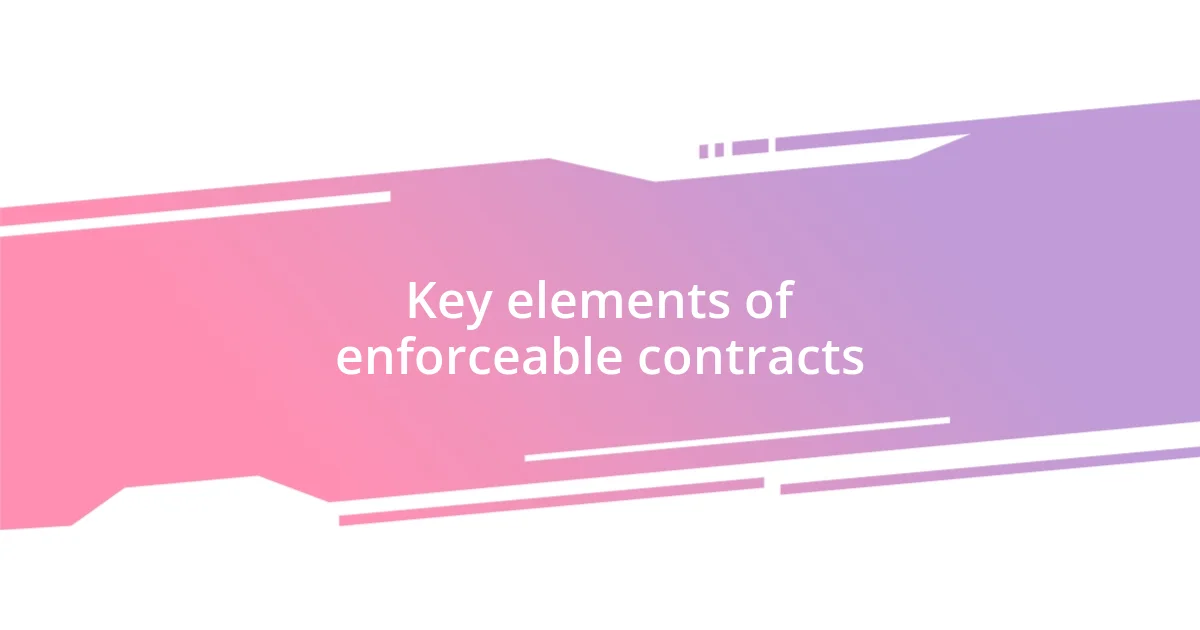
Key elements of enforceable contracts
Mutual consent is where things get heartwarming in contract law. Both parties must willingly agree to the terms laid out in the offer, which is more than just a signature on paper; it’s an emotional commitment. I remember a collaborative project where my partner and I took time to discuss and align our visions. It wasn’t just about agreeing—it felt like coming together as a team, fueled by shared excitement. Don’t you think that shared enthusiasm makes the entire process feel more genuine?
Consideration plays an equally crucial role in making a contract enforceable. It represents something of value exchanged—whether that’s money, services, or even a commitment to act in a specific way. I once traded graphic design services for web hosting, and both of us walked away feeling satisfied and valued. It struck me how this exchange is like a friendship: both parties give something important to each other, creating a foundation of trust and reciprocity. Isn’t it fascinating how business relationships mirror personal ones?
Finally, legality cannot be ignored—it’s the framework within which all contracts operate. A contract must involve legal activities; otherwise, you could find yourself in a world of trouble. When I attempted to set up a joint venture for a project that strayed into murky legal waters, it took a reality check to realize the importance of this element. I often wonder, how many entrepreneurs overlook this crucial aspect, thinking it won’t affect them? Understanding that you need to keep things above board ensures that your hard work doesn’t go to waste.
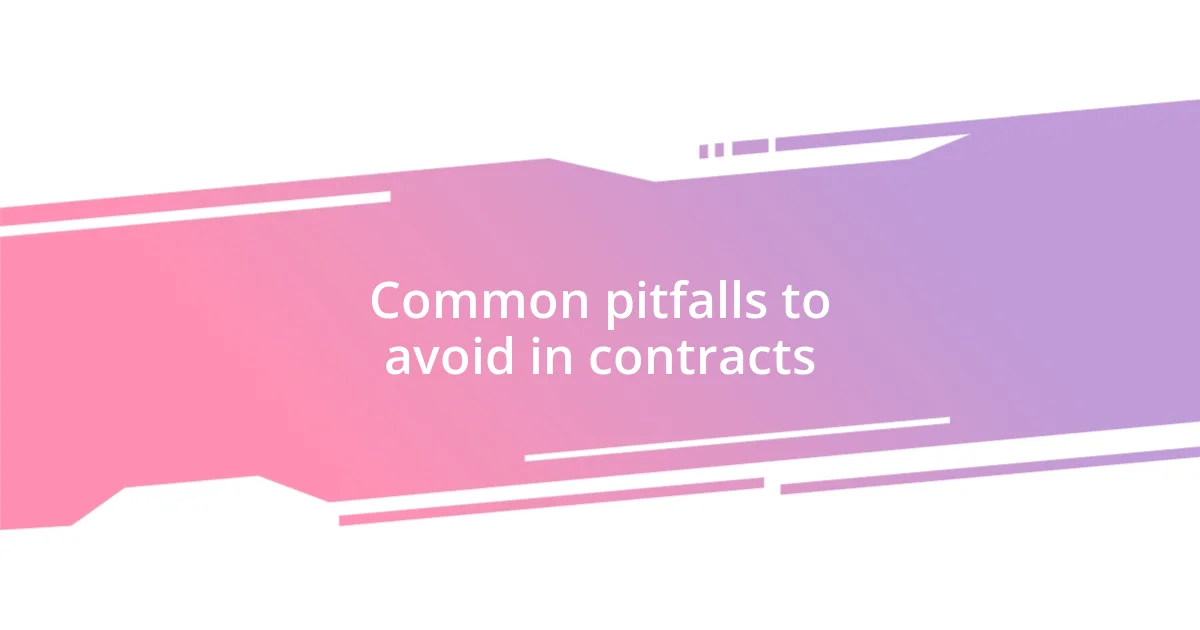
Common pitfalls to avoid in contracts
When entering any contract, one of the most common pitfalls is overlooking the importance of clarity in terms. Ambiguities can lead to misunderstandings and disputes down the line. For instance, I remember a time when I signed a freelance agreement, but the scope of work wasn’t clearly defined. It turned into a frustrating situation where my client expected more than what I had anticipated. Have you ever faced something similar? Clarity in such agreements is crucial; it’s like a roadmap that guides everyone involved.
Another key aspect to avoid is failing to keep track of deadlines and obligations. I once missed a critical date in a service contract due to my assumption that the timeline was flexible. The fallout included not only financial penalties but also damaged my professional reputation. This experience taught me that deadlines are like promises; dismissing them can lead to significant consequences. Have you checked your contract deadlines lately?
Lastly, it’s vital to resist the temptation of neglecting the fine print. I learned this lesson when I skimmed through a rental agreement, eager to move into my new place. Hidden within that fine print was a clause about a hefty exit fee if I chose to leave early. Had I taken the time to read thoroughly, I might have negotiated a better deal. Isn’t it remarkable how important details can often slip through the cracks when we rush things? Taking a moment to read and understand can save you from unexpected surprises.

Importance of contract negotiations
Negotiating contracts is vital because it shapes the very foundation of any agreement. In my experience, I’ve seen how the negotiation phase can transform a basic contract into something tailored to the specific needs of both parties. I remember a project where I initially agreed to a standard set of terms. After a few discussions, we crafted a contract that reflected our unique goals and expectations. Isn’t it amazing how a little back-and-forth can lead to a much stronger partnership?
Moreover, effective negotiation builds trust and enhances relationships. I recall an instance where I was negotiating a service contract with a new client. Instead of simply agreeing to their terms, I took the time to share my thoughts on how we could work better together. By the end of our conversation, we not only established a contract but cultivated a sense of camaraderie that made our collaboration enjoyable. How often do we overlook the relational aspect in favor of just sealing the deal?
It’s also essential to recognize that negotiations are a platform for problem-solving and creativity. When I was renegotiating a licensing agreement that didn’t quite mesh with my goals, I suggested alternative terms that met both parties’ needs. This collaborative approach resulted in a win-win situation, allowing for flexibility where initially there seemed to be none. Have you ever thought about how negotiation can be an opportunity to innovate rather than just settle for the usual terms?

Strategies for effective contract review
One of the key strategies for effective contract review is to break it down into manageable sections. When I tackle a lengthy contract, I often start by summarizing each section in my own words. This not only ensures I grasp the meaning behind the legal jargon but also highlights areas that may require further clarification or negotiation. Have you ever found that summarizing helps you understand complex material better? It’s a powerful technique that keeps me engaged with the content.
Another important approach is to create a checklist of essential elements to look for, including deadlines, payment terms, and dispute resolution methods. I learned this the hard way during a project where I missed a crucial payment schedule because I didn’t have a solid framework in place. Now, before I dive into a review, I make sure to have my checklist handy. This virtually guarantees that I won’t overlook anything vital. What strategies have you used to ensure nothing gets missed?
It’s also beneficial to involve a second pair of eyes, especially when the stakes are high. I remember a situation where I was reviewing a partnership agreement alone and felt confident about it. However, when I invited a colleague to provide feedback, they identified several clauses that could have posed problems later. Collaborating with someone else not only reassured me but also provided fresh perspectives. Have you experienced the value of a collaborative review process? It often leads to a more thorough understanding and stronger contract.












